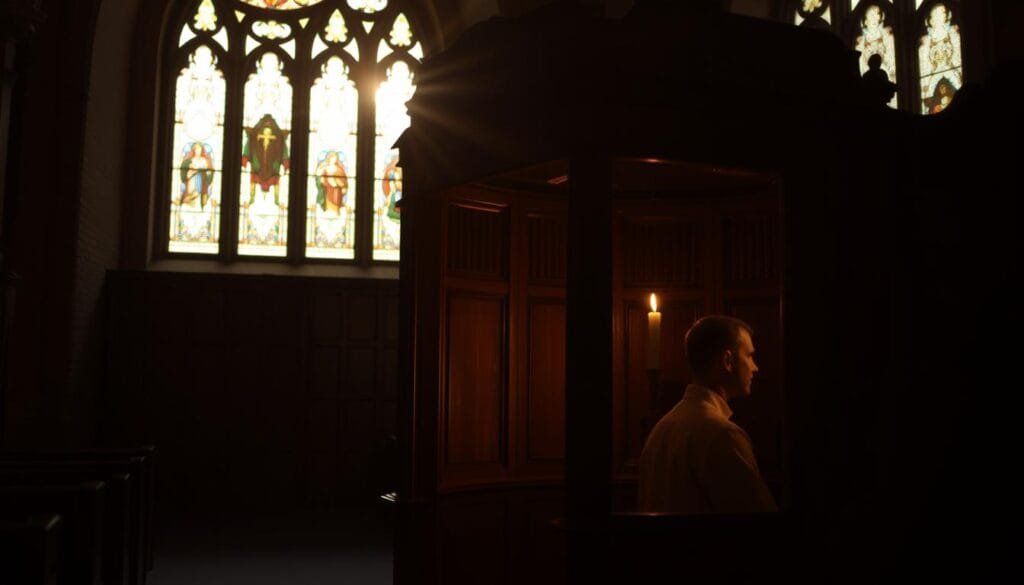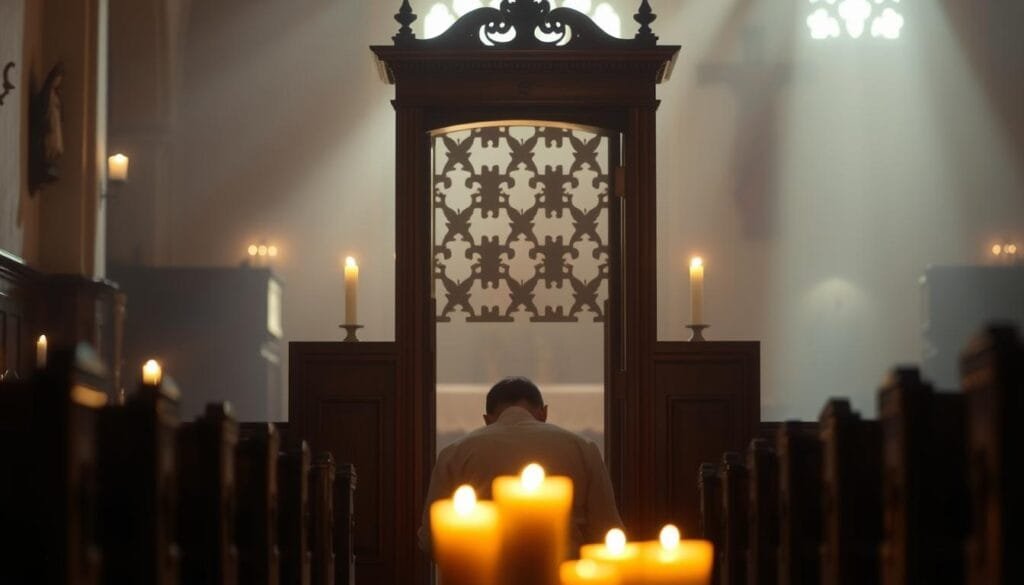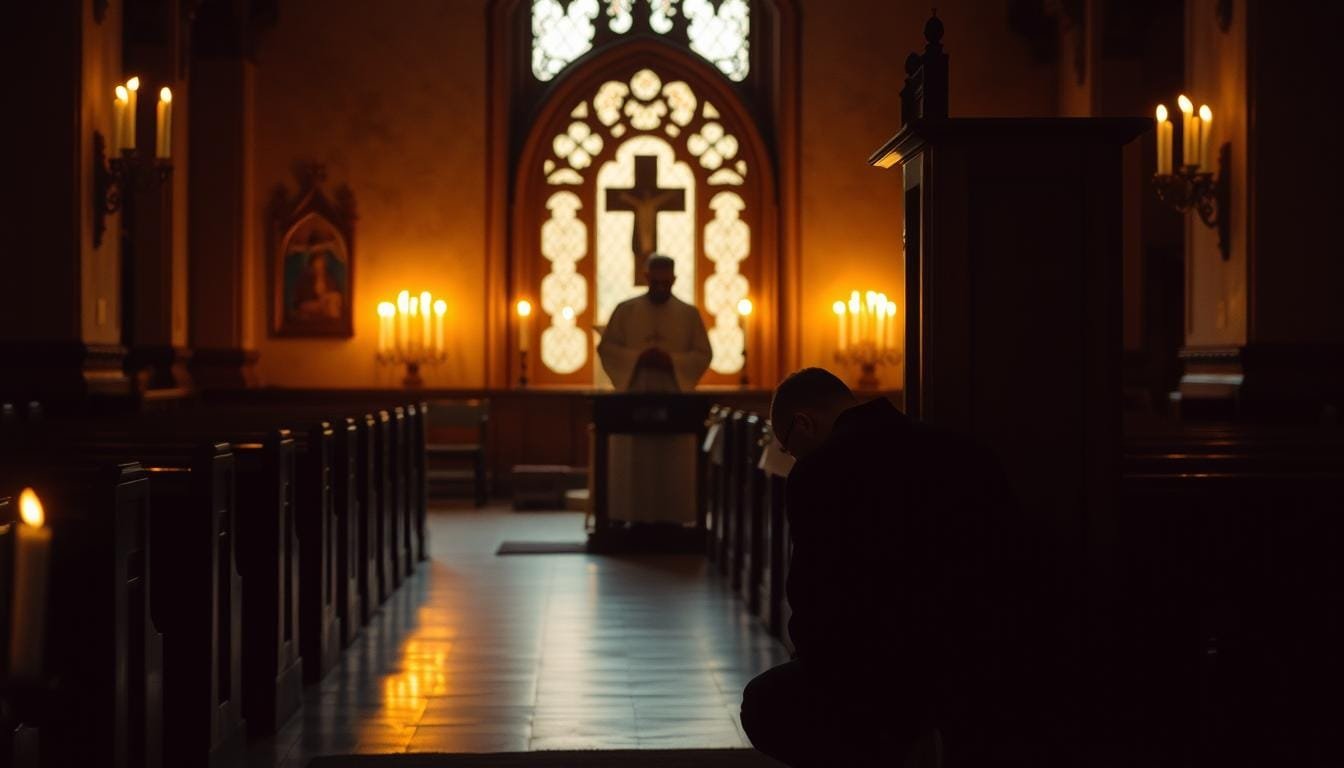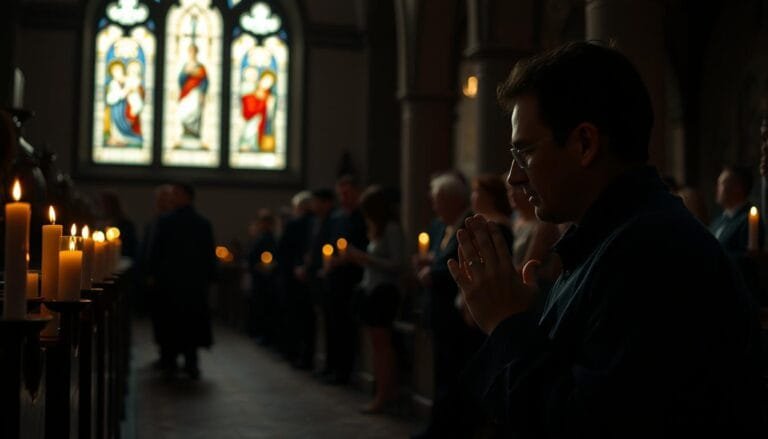Regular Confession: A Vital Part of the Catholic Faith
This website contains affiliate links. As an Amazon Associate, I earn from qualifying purchases. The content on this website was created with the help of AI.
The Sacrament of Penance offers us a path to spiritual renewal and divine mercy. Catholics find healing, grace, and a deeper connection with God through regular confession.
This sacred practice helps us examine our conscience, acknowledge our sins, and receive absolution from Christ through His priests.
Understanding the transformative power of regular confession encourages us to embrace this sacrament as an essential part of our Catholic journey.
It cleanses our souls and strengthens our resolve to live more faithfully and grow in holiness.
Key Takeaways
- Regular Confession is essential for spiritual growth and purification of conscience.
- It helps us develop self-knowledge, Christian humility, and correction of bad habits.
- Confession is a source of grace that strengthens our will and promotes self-control.
- Regular Confession is beneficial even for those who do not commit mortal sins, as it helps address habitual venial sins.
- It invites us to confront parts of ourselves we may perceive as irredeemable and seek forgiveness and healing.
- Through Regular Confession, we can experience the transformative power of God’s mercy and love, deepening our relationship with Him and the Catholic Faith.
- By making Regular Confession a part of our spiritual life, we can live a life inspired by the Gospel and grow closer to God.
Understanding the Sacrament of Reconciliation
The Sacrament of Reconciliation, also known as Confession, is key in the Catholic faith. It offers Forgiveness and healing for those who have sinned.
This sacrament is based on biblical teachings and is a big part of the Catholic tradition.
We believe it lets us feel God’s mercy and Forgiveness in a special way.
Reflecting on our lives shows us how important seeking Forgiveness is. The Sacrament of Reconciliation lets us face our sins, ask for Forgiveness, and get help from a priest.
The priest acts as Christ and the Church, giving us a chance to feel God’s healing and mercy.
The Reconciliation process has four main parts:
- Contrition
- Confession
- Penance
- Absolution
We’re encouraged to examine our consciences, consider our actions, and seek Forgiveness through this sacrament.
This way, we can feel God’s mercy and Forgiveness, growing closer to the Sacrament of Reconciliation and its importance in our lives.
Through the Sacrament of Reconciliation, we find Forgiveness and healing, deepening our bond with God.
As we grow spiritually, we see the value of regularly asking for Forgiveness and reconciliation. This helps us better understand the Sacrament of Reconciliation and its role in our lives.
The Spiritual Benefits of Regular Confession
Regular confession has many spiritual benefits. It helps us grow, heal, and change, leading to a deeper sense of purpose and direction in our lives.
According to Pope Pius XII, regular confession boosts self-knowledge and humility. It also helps us fight against spiritual laziness.
By confessing often, we grow closer to God and feel peace and forgiveness.
Some key benefits of regular confession include:
- Increased self-knowledge and humility
- Correction of bad habits and resistance to spiritual neglect
- Purification of conscience and strengthening of will
- Achievement of salutary self-control and increase in grace
We can enjoy these benefits by making confession a regular part of our lives. Pope John Paul II said it renews our fervor and strengthens our will.
Let’s prioritize confession and experience God’s forgiveness and mercy.
How to Prepare for Confession
As we get ready for the sacrament of reconciliation, it’s key to examine our conscience and make a sincere act of contrition.
This thoughtful process helps us see where we’ve fallen short and seek forgiveness.
We should reflect on our actions, thoughts, and intentions, focusing on how we’ve failed to love God, our neighbors, and ourselves.
Products not fetched from DB and/or API. Please check debug logs.It’s vital to regularly examine our consciences. It’s best to do this every night before bed. Take a few minutes to think about your actions and how you can do better.
Resources like the Baltimore Catechism can help us understand sin and prepare for confession.
When getting ready for confession, remember the steps involved.
These include finding out your sins, being truly sorry, making a firm resolve not to sin again, telling your sins to the priest, and doing the penance given.
Guides and videos from Catholic figures can aid in this process. Spend at least 30 minutes before confession reflecting on your sins and your relationship with God.
To make the most of confession, treat it as a non-negotiable appointment. Look up confession times at local parishes.
This ensures we prioritize our spiritual growth and make regular confession a part of our lives. Remember, the goal is true conversion and lifestyle change, not just to feel less guilty.
By focusing on holiness and our relationship with God, we can fully experience the power of reconciliation.
What Happens During Regular Confession
During Regular Confession, people meet the Risen Christ face-to-face. They feel mercy, forgiveness, and healing.
The priest, acting as Christ and the Church, guides and supports us. He helps us see our sins and how to find forgiveness.
The Sacrament of Reconciliation is key in this journey. It lets us feel God’s love and mercy. This sacrament heals our bond with God and the community.
It helps us reflect, seek forgiveness, and find peace and renewal.
Some important parts of the Sacrament of Reconciliation are:
- Confessing serious sins to a priest, who keeps the secret
- Getting absolution and spiritual advice from the priest
- Feeling reborn, reconciled with God, and restored
- Feeling peace, joy, and spiritual comfort after confession

By going to Regular Confession, we learn more about our sins. We seek forgiveness and grow closer to holiness.
The Church suggests going to confession often. At least once a year, we should confess serious sins.
Overcoming Common Fears and Hesitations
We might feel scared or unsure when we think about the sacrament of reconciliation. One big worry is confidentiality.
We fear that our deepest secrets will be shared. But, the seal of confession is a sacred promise. Priests must keep all confessions secret.
Another fear is feeling shame and embarrassment when we confess. We might think we’re the only ones with certain problems.
But, the Bible says we all face temptation (1 Corinthians 10:12-13). Sharing our sins helps us heal and find freedom.
Finding a trusted confessor is key to beating these fears. Look for a priest or spiritual director who listens without judgment. This step can bring us peace and freedom.
Scripture offers comfort as we face our fears. It says God is happier when one sinner repents than ninety-nine just people (Luke 15:7).
By facing our fears and embracing reconciliation, we find peace and draw closer to God.
Building Regular Confession into Your Spiritual Life
Deepening our bond with God means adding Regular Confession to our Spiritual Life. It helps us think about our actions, ask for forgiveness, and grow personally.
By doing Regular Confession, we become more humble and open to change, leading to a clearer purpose and direction in our lives.
Pope Francis says, “the God of mercy does not tire of forgiving.” This shows how crucial it is to keep asking for forgiveness.
Many churches offer guides to help us prepare for confession. We can find where we need to improve and ask for forgiveness by thinking about our thoughts, words, and actions.
Some good things about Regular Confession in our Spiritual Life are:
- Deepening our relationship with God
- Fostering humility and contrition
- Receiving guidance for personal growth
- Experiencing the transformative power of God’s mercy and love

Making Regular Confession a key part of our Spiritual Life makes us feel free and renewed. This is what “Behold I make all things new” (Rev 21:5) means.
Let’s make Regular Confession a regular part of our spiritual practice and always try to get closer to God.
The Transformative Power of Frequent Reconciliation
Reflecting on our spiritual journey, we see that Transformative Power is real.
By praying for forgiveness after confession, we invite God’s mercy into our lives, allowing us to grow and deepen our bond with Him.
Frequent Reconciliation is crucial for our spiritual health. It lets us feel God’s love and mercy in a special way. Regularly seeking forgiveness prepares us for a life of growth and spiritual change.
Some key benefits of Frequent Reconciliation include:
- Deeper relationship with God
- Increased sense of humility and contrition
- Greater sense of purpose and direction in life
Our goal is to live a holy and virtuous life. Frequent Reconciliation is not just a sacrament but a way of life.
It opens us to God’s mercy and love, helping us grow closer to Him and live with grace and mercy.
Conclusion: Embracing the Gift of Divine Mercy
As we wrap up our exploration of regular confession, let’s explore the gift of divine mercy.
The Catholic Church teaches us that Christ welcomes us in confession with love and compassion, as shown in the parable of the Prodigal Son.
By going to confession often, we can feel this deep mercy and grow closer to God.
Regular confession helps us become more humble, sorry, and thankful for the forgiveness we get.
As we aim to live a holy and virtuous life, remember this sacrament’s role. It’s a chance to meet the Risen Christ and feel the divine mercy that’s waiting for us.
May our hearts be ready to receive the healing and grace that comes from this meeting, helping us to truly follow Christ.






